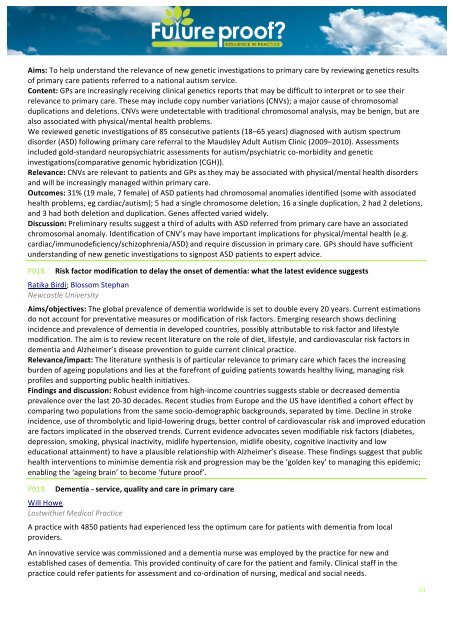RCGP-2014-poster-abstracts
RCGP-2014-poster-abstracts
RCGP-2014-poster-abstracts
Create successful ePaper yourself
Turn your PDF publications into a flip-book with our unique Google optimized e-Paper software.
Aims: To help understand the relevance of new genetic investigations to primary care by reviewing genetics results <br />
of primary care patients referred to a national autism service. <br />
Content: GPs are increasingly receiving clinical genetics reports that may be difficult to interpret or to see their <br />
relevance to primary care. These may include copy number variations (CNVs); a major cause of chromosomal <br />
duplications and deletions. CNVs were undetectable with traditional chromosomal analysis, may be benign, but are <br />
also associated with physical/mental health problems. <br />
We reviewed genetic investigations of 85 consecutive patients (18–65 years) diagnosed with autism spectrum <br />
disorder (ASD) following primary care referral to the Maudsley Adult Autism Clinic (2009–2010). Assessments <br />
included gold-‐standard neuropsychiatric assessments for autism/psychiatric co-‐morbidity and genetic <br />
investigations(comparative genomic hybridization (CGH)). <br />
Relevance: CNVs are relevant to patients and GPs as they may be associated with physical/mental health disorders <br />
and will be increasingly managed within primary care. <br />
Outcomes: 31% (19 male, 7 female) of ASD patients had chromosomal anomalies identified (some with associated <br />
health problems, eg cardiac/autism); 5 had a single chromosome deletion, 16 a single duplication, 2 had 2 deletions, <br />
and 3 had both deletion and duplication. Genes affected varied widely. <br />
Discussion: Preliminary results suggest a third of adults with ASD referred from primary care have an associated <br />
chromosomal anomaly. Identification of CNV’s may have important implications for physical/mental health (e.g. <br />
cardiac/immunodeficiency/schizophrenia/ASD) and require discussion in primary care. GPs should have sufficient <br />
understanding of new genetic investigations to signpost ASD patients to expert advice. <br />
P018 <br />
Risk factor modification to delay the onset of dementia: what the latest evidence suggests <br />
Ratika Birdi; Blossom Stephan <br />
Newcastle University <br />
Aims/objectives: The global prevalence of dementia worldwide is set to double every 20 years. Current estimations <br />
do not account for preventative measures or modification of risk factors. Emerging research shows declining <br />
incidence and prevalence of dementia in developed countries, possibly attributable to risk factor and lifestyle <br />
modification. The aim is to review recent literature on the role of diet, lifestyle, and cardiovascular risk factors in <br />
dementia and Alzheimer’s disease prevention to guide current clinical practice. <br />
Relevance/impact: The literature synthesis is of particular relevance to primary care which faces the increasing <br />
burden of ageing populations and lies at the forefront of guiding patients towards healthy living, managing risk <br />
profiles and supporting public health initiatives. <br />
Findings and discussion: Robust evidence from high-‐income countries suggests stable or decreased dementia <br />
prevalence over the last 20-‐30 decades. Recent studies from Europe and the US have identified a cohort effect by <br />
comparing two populations from the same socio-‐demographic backgrounds, separated by time. Decline in stroke <br />
incidence, use of thrombolytic and lipid-‐lowering drugs, better control of cardiovascular risk and improved education <br />
are factors implicated in the observed trends. Current evidence advocates seven modifiable risk factors (diabetes, <br />
depression, smoking, physical inactivity, midlife hypertension, midlife obesity, cognitive inactivity and low <br />
educational attainment) to have a plausible relationship with Alzheimer’s disease. These findings suggest that public <br />
health interventions to minimise dementia risk and progression may be the ‘golden key’ to managing this epidemic; <br />
enabling the ‘ageing brain’ to become ‘future proof’. <br />
P019 <br />
Dementia -‐ service, quality and care in primary care <br />
Will Howe <br />
Lostwithiel Medical Practice <br />
A practice with 4850 patients had experienced less the optimum care for patients with dementia from local <br />
providers. <br />
An innovative service was commissioned and a dementia nurse was employed by the practice for new and <br />
established cases of dementia. This provided continuity of care for the patient and family. Clinical staff in the <br />
practice could refer patients for assessment and co-‐ordination of nursing, medical and social needs. <br />
24



